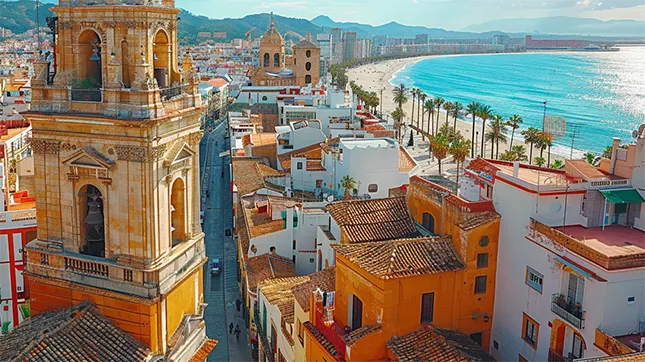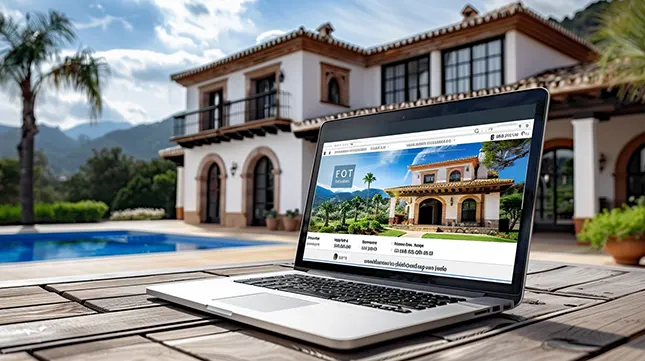Buying Property in Spain as a Foreigner from UK

Are you thinking about buying a home in Spain?
Imagine waking up to the Spanish sun, enjoying a laid-back lifestyle, and diving into a vibrant culture every day. Spain is a top choice for many UK citizens looking for the perfect blend of relaxation and excitement.
It’s no wonder Spain remains a top choice for Brits looking for a new adventure and an escape from the dreary UK weather.
Spain’s almost constant sunshine and diverse landscapes appeal to many.
Whether you’re dreaming of retiring by the sea, investing in a holiday home, or immersing yourself in the lively culture of cities like Madrid, Barcelona, or Valencia, Spain offers something for everyone.
Despite the changes brought by Brexit, buying a home in Spain is still feasible for UK citizens.
The thriving British expat community proves that many have successfully navigated the process.
Sure, there are challenges, but with the proper guidance, you can join the many Brits who call Spain their home.
If you’re considering moving to Spain or buying a permanent or holiday property, our guide covers the entire process.
From securing the essential NIE number and hiring a trustworthy lawyer to finding the perfect property with the help of a local real estate agent, we’ve got you covered.
Dive into our comprehensive guide to learn about the step-by-step process, explore stunning locations, and understand the legal essentials.
Why Spain: What Does Spain Offer UK ex-pats?

Spain is one of the most popular ex pat destinations for a reason!
Spain’s allure lies in its diverse landscapes, from bustling cosmopolitan cities like Madrid and Barcelona to serene coastal towns and islands.
The country’s rich culture, stunning architecture, delicious cuisine, and friendly locals make it an attractive destination for Brits seeking a total lifestyle change or, for some, merely looking for a new life adventure.
Another of the many benefits of choosing Spain is that frequent flights and a short travel time make it incredibly accessible, whether you want to nip home for a while or for anyone planning to visit.
Can UK Ex-pats Buy a Home in Spain?
Despite the after-effects of Brexit, UK expats can still purchase a home in Spain.
Buying a holiday home in Spain might seem daunting, but the country welcomes foreign buyers, and the process remains very similar.
The process is relatively straightforward, with no special requirements or paperwork exclusively for foreigners. However, there are a few key steps to keep in mind.
First, you’ll need a financial number known as an NIE (Número de Identificación de Extranjero).
You can obtain an NIE by visiting a Spanish police station with your passport. While this process is usually quick for Spanish and EU citizens, non-EU buyers, including those from the UK, can take a few weeks.
Spain traditionally encourages foreign investment in its property market.
There’s even a Golden Visa scheme, which offers residency to foreigners who purchase property worth more than £500,000. This program is an attractive option for those looking to buy a home and gain residency.
Despite the complexities that may arise, particularly post-Brexit, Spain’s clear and accessible rules help ensure a smoother experience for foreign buyers.
By understanding these steps and preparing in advance, you can confidently navigate the process and enjoy the benefits of owning a beautiful home in Spain.
Getting Started: Making the Right Choices
There is much to be done before you can get your Spanish relocation underway.
Everyone’s priorities will differ, but some common factors will apply to anybody thinking of making this huge life change.
Before starting your property journey, you need to be specific about two things: first, how much you want to spend on a home and second, your choice of location.
Setting your budget will likely be the easier of the two decisions.
Review your savings, income, and expenses to determine how much you can afford.
Factor in extra costs such as taxes, legal fees, notary fees, and property registration. Typically, these can add up to 10-15% of the property’s purchase price.
Finding the right location is another key consideration.
Researching the property market in different regions of Spain is vital. Prices can vary widely between cities, coastal areas, and rural locations.
Plus, different regions offer varying lifestyles. Coastal areas like Costa del Sol provide beach life, while cities like Madrid and Barcelona offer urban experiences.
Another consideration is the climate. Some areas of Spain can be unbearably hot in mid-summer, while the north experiences cooler, wetter weather, more akin to the UK.
There will be other considerations. However, these are the most common ones you will encounter along the way.
About the Spanish Property Market
The Spanish property market has shown resilience and growth over the past two years.
Despite a slight dip in transactions at the end of 2023, 2024 has seen a positive trend, with property values holding steady.
Key locations like Barcelona and Madrid have experienced significant growth, with property prices rising by approximately 8.2%.
Demand continues to outstrip supply in many areas, driving prices higher than expected.
However, some experts predict that this high demand may level off by the end of 2024, potentially moderating prices and creating more buyer opportunities.
Take a look at the Spanish Property Insight webpage, recommended by the UK Government; it is packed with valuable and relevant information about the Spanish property market.
Where do you Want to Live in Spain?

Spain is home to some wonderful towns and cities including Valencia.
Spain offers a wide range of property locations and options.
While prices vary widely between cities, coastal areas, and rural locations, they are generally lower than in the UK, and many bargains are available, especially outside major cities.
Popular spots like Marbella, Torrevieja, and Mallorca cater to different tastes and budgets.
If you holiday in Spain regularly, you may already be familiar with specific locations. However, here are some you might want to consider:
Tenerife
The largest of the Canary Islands, Tenerife boasts a warm climate year-round, diverse landscapes, and various outdoor activities. It’s a popular destination for both tourists and expats.
Alicante
This region and its cities are popular choices with UK expats. Known for its sandy beaches, palm-lined boulevards, traditional Spanish charm, and lovely warm climate, Alicante is a top choice for those seeking a relaxed Mediterranean lifestyle.
Mallorca
This beautiful Balearic Island is famous for its stunning beaches, crystal-clear waters, and vibrant nightlife. It’s famous for those seeking a holiday home or a relaxed island lifestyle.
Costa del Sol
The Southern coast of Spain, with its abundant sunshine, beautiful beaches, and stunning Andalusian landscapes, continues to attract Brits. Whether for holidays or relocation, Costa del Sol’s appeal is undeniable.
Granada
Known for its rich history and the stunning Alhambra Palace, Granada offers a mix of cultural experiences and beautiful scenery. The city’s blend of Moorish and Spanish influences makes it a unique place to live.
Valencia
This region and the city are fantastic spots for UK ex-pats. Situated in the cooler north, Valencia offers modern architecture, a vibrant cultural scene, and some of the best paella in the country, making it a great place to settle.
Costa Brava
This coastal region in northeastern Spain is known for its rugged coastline, charming villages, and beautiful beaches. It’s an excellent spot for those looking for a quieter, scenic place to live.
Benidorm
Known for its lively atmosphere, Benidorm has been a favourite among British holidaymakers and retirees for decades. With sandy beaches, excellent transport connections, and a plethora of shops, bars, and restaurants, Benidorm is a city that never sleeps. Yet, peaceful spots can be found if you know where to look.
Murcia
Often overlooked, Murcia offers excellent value for money when it comes to property prices. This inland, rural region is famous for its delightful tapas, which provide a more authentic Spanish experience.
Torrevieja
Situated in the Costa Blanca, this former fishing village has become increasingly popular among British expats. With its close proximity to major airports and stunning coastline, Torrevieja is a melting pot of nationalities and a great place to consider for property investment.
Madrid
Spain’s bustling capital offers a cosmopolitan lifestyle with elegant architecture, fabulous food, an efficient public transport system, and an international expat community. However, it can be a pricey location for property buyers.
Barcelona
Known for its cultural vibrancy, food, and nightlife, Barcelona is an uber-trendy city in Catalonia. Living in the heart of this action-packed city comes with a high price tag, making it one of the most expensive places in Spain to buy property.
How to Find Your Ideal Home

Searching for a house in Spain may be easier than you think.
With your finances sorted and your location chosen, it is time to search for your dream home.
Finding a property in Spain is relatively straightforward, with numerous websites and estate agents catering to various languages and nationalities.
British real estate websites often list Spanish properties. Though they typically focus on holiday homes, Rightmove does advertise permanent accommodation.
For a broader selection, consider using Spanish property sites. Popular platforms include
You can explore several avenues to find a property:
- Estate Agents (Inmobiliaria): They typically work on behalf of the seller and charge fees around 3% of the property price, which the seller usually pays.
- Online Portals: Connect owners directly with buyers, offering thousands of options.
- Local Ads and Word of Mouth: These are useful for finding properties in specific neighbourhoods.
Hiring a specialist buying agent or broker can be beneficial if you’re new to the Spanish market.
They provide valuable insights and advice, but ensure you understand their fees and services, as these can vary.
It’s possible to purchase a home before arriving, but visiting and viewing the property in person is advisable to avoid potential risks.
For more detailed insights, visit Spanish Property Insight.
Beware of Scammers
This is just a note of caution. Like the rest of the world, Spain has had its fair share of scammers and fraudsters.
Be vigilant when purchasing property in Spain (or any foreign country). Fraudulent schemes that target unsuspecting buyers can occur.
When working with property experts, brokers, or agents, verify their membership in professional bodies.
For instance, the API (Agente de la Propiedad Inmobiliaria) is an association of Spanish realtors. Choosing an agent with this membership ensures you deal with a reputable professional.
Wherever possible, speak to other expatriates who have already transitioned from the UK to Spain. Personal recommendations are the best way to stay safe from scammers.
Exercise Caution and Do Your Homework Before Making the Move:
- Before sending money or a deposit, exercise caution. Investigate thoroughly and consider meeting or speaking directly with the seller.
- Verify that the seller has legal rights to sell the property.
- If you have concerns about the property’s condition, arrange an inspection or survey.
Remember these points to navigate the property market in Spain more confidently.
How Much Will a Home Cost in Spain?
Property costs are difficult to estimate precisely as they vary greatly depending on size, location, and condition.
Each province has its own pricing merits; however, when you start your property journey, you may be amazed at how much cheaper some areas are compared to the UK.
Alicante and Malaga offer excellent value for money.
In Malaga, for example, a detached three-bedroomed home costs a very reasonable £134,210 out of town, while a house near the centre costs more than £300,000.
In Alicante, another Spanish expat hotspot, three-bedroom homes are slightly cheaper and can be bought for around £120,000.
If you want to explore other regions of Spain and discover just how cheap homes can be, visit Idealista, an easy-to-use property-for-sale website.
Spain offers plenty of bargain property opportunities if you have a tight budget and want to build or renovate a home to save on cost.
Financing a Property Purchase in Spain for Non-EU Residents
While many overseas buyers purchase property in Spain without a mortgage, securing financing is also viable.
Both Spanish and international banks offer mortgages, with some tailored specifically for expats.
As a non-EU resident, you might face a lower loan-to-value (LTV) ratio than Spanish residents, requiring a larger deposit.
Typically, Spanish residents can borrow up to 80% of a property’s assessed value, whereas non-residents may be limited to 60-70% LTV, depending on the mortgage type.
Before you can finalise a mortgage, you must own the property. Therefore, it’s crucial to include a clause in the purchase contract that allows you to withdraw if you cannot secure a mortgage. This clause protects you from potential financial loss.
When seeking a mortgage, prepare to provide detailed financial information, including proof of income, existing debts, and credit history. It’s also advisable to compare offers from different lenders to secure the best terms.
For more detailed guidance, visit HTBIS and read their ultimate guide to getting a Spanish mortgage.

Estate agents in Spain will give you an insight into local property markets but there are a few things to keep in mind.
Estate agents in Spain can be incredibly helpful in your property search.
They often have extensive knowledge about the region, are bilingual, and frequently assist overseas buyers.
However, be cautious, as the industry is not heavily regulated, and some unscrupulous agents exist. Avoid agents who demand upfront payments or suggest shortcuts.
Remember, you have the freedom to choose your own notary, mortgage provider, and other services rather than relying solely on recommendations from the estate agent.
This can help ensure transparency and avoid conflicts of interest.
You can explore real estate agencies and property companies listed in Expatica’s Spanish directory for more options.
Taking these precautions will help you find a trustworthy agent and make your property-buying experience less of a worry.
Take a look at Expatica’s Spanish directory. They have an extensive list of recommended agents operating all over the country.
Hiring a Solicitor or Notary in Spain
While not legally required to complete a property sale, hiring a solicitor is highly recommended, especially as many mortgage lenders insist on it.
This is especially important in Spain, as debts are attached to the property and transferred with the ownership.
A solicitor ensures due diligence, safeguarding your investment.
The buyer is responsible for registering the property.
Notaries can assist with this for a fee by notifying the registry office of the sale, but they may not complete full registration.
Ensure your solicitor is registered with the local bar association (Colegio de Abogados) and verify their registration number. This is a minimum standard for professionalism.
For more information, check out Abogacía Española.
What to do When you Find your Perfect Home

Once you find your dream home you can begin the legal process of buying the property.
Be patient; it can take time to research and find the perfect property for you.
When you do, the legal processes can begin – an exciting step closer to owning your forever Spanish home.
There are several steps to cover before you can conclude your purchase:
- Offer & Negotiation: Make and negotiate offers through your agent.
- Agreement: Sign a reservation contract and pay a reservation fee.
- Searches & Checks: Legal checks ensure no hidden surprises. A house survey helps you ensure there are no significant defects with the property.
- Purchase Contract: Sign and proceed with mortgage applications if needed.
- Completion: Finalise the purchase and sign the contract (escritura de compravento) at a local notary’s office.
- Post-Purchase: Set up utilities and insurance.
What Taxes or Fees will I have to Pay?
When buying property in Spain, you must account for various taxes and fees that will increase your overall budget.
You can expect to have the following charges on top of the purchase price:
- Property Transfer Tax: It ranges from 6% to 10% of the purchase price, depending on the region.
- Notary Fees, Land Registration Fee, and Title Deed Tax: Combined, these typically amount to 1-2.5% of the purchase price.
- Legal Fees: Hiring a lawyer will generally cost approximately 1-2% of the property’s price.
- Estate Agent Fees: These are usually paid by the seller and are around 3% of the property’s price.
Additional Considerations
Annual Property Taxes: Be aware of ongoing property taxes such as the Impuesto sobre Bienes Inmuebles (IBI).
Non-Resident Income Tax: Non-EU residents may be subject to this tax, calculated on the property’s potential rental income.
Closing Thoughts on Buying Your Home in Spain
Buying a property is a thrilling adventure, especially in a beautiful country like Spain.
While navigating a new system can be challenging, following the steps in this guide and seeking the right local help can help to make the process enjoyable.
With some preparation and the right resources, you’ll soon be enjoying your dream home under the Spanish sun.
Best of luck with finding, buying, and settling into your new home in Spain! ¡Buena suerte!
Moving Your Belongings

White & Company Truck
Will you be moving your belongings to Spain?
There are several reasons why you should.
Having your usual belongings can help maintain your daily routines and habits, which can be a significant stabilising factor in a new and potentially overwhelming environment.
Familiarity can also reduce homesickness and stress, making the transition to Spain smoother.
Transporting your things to Spain is also much cheaper and less hassle than repurchasing everything from scratch.
Companies like White & Company specialise in Spanish removals.
Our expertise and meticulous care ensure that your belongings arrive safely at their destination.
Contact us today via phone, our online quick quote form, or our interactive Bot.
The first step is to schedule a pre-move survey.
Our friendly surveyors can visit your location or conduct a virtual survey, allowing us to offer you a competitive, no-obligation quotation.

Max is a seasoned writer and blogger in the real estate and home moving sectors, as well as a knowledgeable source of information for expatriates living and working abroad. His detailed insights have helped thousands of people move and live abroad with greater simplicity and ease.
Posted in: News
Leave a Comment (0) ↓


